EVEREST Pilot Projects Update – 2023
During the 2021-2022 grant fiscal year the Enhanced Virtual Education, RESearch, and Training (EVEREST) Pilot Project was initiated in response to student training during the COVID-19 pandemic. The primary goal of the EVEREST funding mechanism is to identify and develop novel virtual/remote education methods, laboratory and research pedagogy, and hybrid training that lessens the need for in-person interactions with students. Eight of our investigators earned seven EVEREST awards in the scientific themes of Cancer, Environmental Health Sciences, and Neuroscience.
- When the pandemic ceased face-to-face social interaction research, Dr. Thomas Malloy focused on intergroup and interpersonal behavior at Rhode Island College. His neuroscience project “Development of an Online Platform for Dyadic Interaction Research” recruited participants and developed face-to-face interactions in a virtual environment by integrating existing software for virtual interactions (Zoom) with software currently used for online data collection (Qualtrics). The development of this system was essential and highly useful for people to interact without fear of infection.
Four Providence College investigators received three awards.
- The cooperative endeavor of Dr. Kathleen Cornely and Dr. Tyler Stack‘s cancer research project “A computational approach to the study of malate dehydrogenase” focused on studying mutations of human malate dehydrogenase, an essential enzyme in central metabolism, and how changes in the enzyme relate to adaptations in the metabolism of cancer. They developed their current Course-based Undergraduate Research Experiences (CURE) in CHM 310 to incorporate virtual methods in a fully remote setting during the COVID-19 pandemic and complemented in-person instruction post-pandemic. Dr. Stack shared,
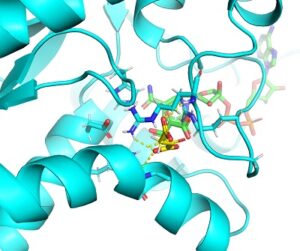
Dr. Kathleen Cornely and Dr. Tyler Stack, Providence College “The pandemic required us to shift our lab instructions to be done virtually, so this project has created content on computational biochemistry that we otherwise would never have tried to implement. Now, we consider how “dry” lab calculations can inform our “wet” lab experiments, which we then use to generate new hypotheses to test in our computations.”
The resources are now a regular part of their biochemistry lab course where the students build virtual models of mutated malate dehydrogenase (MDH) and predict how that would change its specificity for malate versus other molecules, and once they find a specific mutation, they create it in the lab and test their hypothesis. Dr. Cornely spent a sabbatical working in the laboratory of Dr. Joseph Provost at the University of San Diego, one of the founders of the MDH CURE Community. One of the outcomes of the sabbatical is establishing a collaborative research project involving Providence College (PC) and University of San Diego (UCSD) students. They will construct MDH mutants that are phosphomimics to study the effect of post-translational modification on protein structure and enzyme function and their collaborative work will involve both wet lab experiments and bioinformatics tools. Dr. Provost’s lab uses the following databases in their work: Human Protein Atlas, Ace View, Phosphosite.net, GPS5.0, NetPhos3.1, KinasePhos2.0, and DISPHOS, and their collaboration has the potential to extend our knowledge of bioinformatics tools further to inform their work at PC and UCSD.
- To address the difficulty of replicating discovery and experimentation during the pandemic, Dr. Seann Mulcahy’s project “An Interactive Online Organic
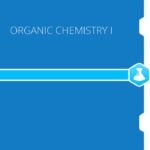
Organic Chemistry I Text. Seann Mulcahy, Providence College Chemistry Textbook with Biomedical Applications” (EHS) describes the exciting biomedical and health science applications of organic chemistry as a way to inspire students to persist towards STEM degrees. Dr. Mulcahy shared, “The two free, interactive, online LibreTexts chemistry textbooks unburdened students from the high costs of science textbooks as Open Education Resources. This is one piece of a larger effort to make STEM courses more inclusive. Because the textbook is freely available, no student in my course will need to incur any debt from the purchase of course materials. This will level the playing field for students who are low income or who come from otherwise modest backgrounds.”
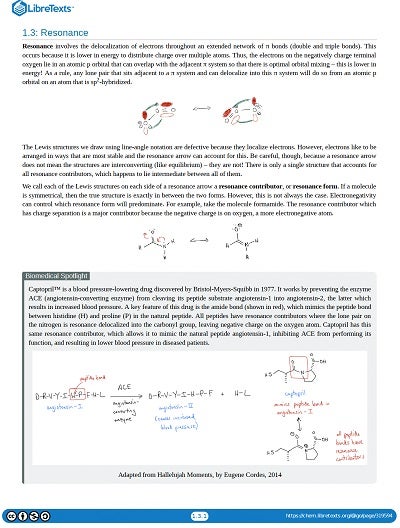
1.3 Organic Chemistry II, Seann Mulcahy The first semester content is published in Organic Chemistry I (August 2021) and the second semester coursework in Organic Chemistry II (July 2023). Mulcahy continues to use this online textbook in his course. “This is the third academic year of use, and students enjoy using it. The next step in making the online textbook more useful is to add example problems to the end of each section. This will allow students to actively practice what they’ve learned in order to get real-time feedback. I would like to thank the RI-INBRE EVEREST grant that I received for support for this project and for more broadly making learning resources more accessible to students at Providence College and beyond,” said Mulcahy.
- Dr. Todd Olszewski developed a virtual simulation activity for Health Policy and Management (HPM) students at Providence College for “Translating Research into Public Health Policy.” The module has students work collaboratively to develop their own hypothetical COVID-19 vaccine deployment strategy for the state of Rhode Island. The Environmental Health Sciences project was designed to equip the next generation of public health and health services professionals with a concrete understanding of the challenges associated with converting scientific discoveries into public health interventions in equitable fashion. Crafting module scenarios and supporting documents gave Olszewski the opportunity to consider new ways of integrating lessons in interprofessional leadership into future HPM courses.
At the University of Rhode Island’s College of Pharmacy, three awardees created successful projects.
- The publication “Developing virtual and augmented reality applications for science, technology, engineering and math education” in Biotechniques (June 2023, PMID37291856) resulted from the collaboration between Dr. Christopher Hemme, RI-INBRE Bioinformatics Core Director, and EVEREST awardees Dr. Jyothi Menon and Dr. Jie Shen. Their joint efforts created the first two apps developed as both Virtual Reality (VR) and 3D gaming versions. Virtual pedagogy such as VR simulation and 3D gaming, provide an interactive and engaging platform for students to learn materials and enhance student learning outcomes.
- Large numbers of students were introduced to Dr. Jyothi Menon’s Cell Culture Training VR App that simulated aseptic cell culture laboratory that provided a competitive advantage in biomedical industries upon graduation with her project “A Simulated Cell Culture Laboratory for Student Training on Aseptic Techniques”, an environmental health sciences theme.
- “3D Game-Based Nanotechnology Lab as an Enhanced Education/Training Pedagogy”, an environmental health sciences award, was led by Dr. Jie Shen and utilizes novel virtual education pedagogy to support experiential and hands-on education in nanotechnology-based drug products, which in turn will help improve public health. The Nanoparticle and Liposome VRApp was developed that create nanoparticles and liposomes used in drug delivery methods, and virtually reconstruct laboratory equipment for their synthesis.

Cell Culture VR App. Dr. Jyothi Menon, University of Rhode Island 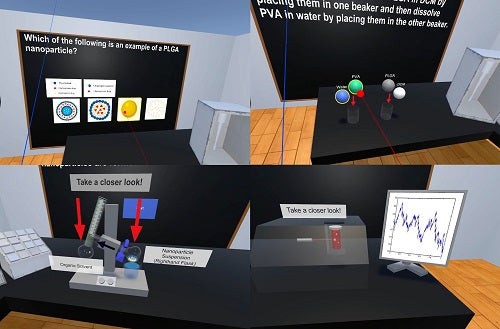
Nanoparticle Composite VR App. Dr. Jie Shen, University of Rhode Island
- Facilitated by Dr. Matthew Bertin, the EHS project “Integrating LC-MS/MS based molecular networking and analysis of medicinal plants”, unmasked the
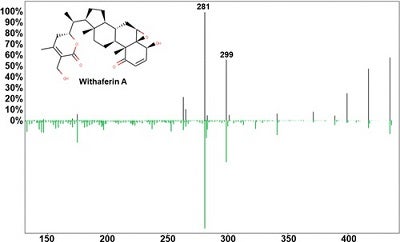
Figure 3. Bertin, URI. https://doi.org/10.1021/acs.jchemed.1c01212 cutting-edge metabolomics techniques for students to gain proficiency in LC-MS/MS analysis, one of the most sought-after techniques of prospective employers in the biomedical field. Dr. Bertin said, “The EVEREST project has changed my approach to teaching by providing more evidence that ‘course-based undergraduate research experiences’ (CUREs) are key to developing scientific competencies, project ownership, and enthusiasm for science. We have expanded these teaching approaches into virtual reality in order to ‘scale up’ the amount of students who can get a primer with respect to hands-on training by converting HPLC and mass spectrometry operations and analysis into a virtual platform and 3D game that students can even experience from their home computers.” The teaching and research project resulted in the publication of Incorporating LC−MS/MS Analysis and the Dereplication of Natural Product Samples into an Upper-Division Undergraduate Laboratory Course, in the Journal of Chemical Education (June 2022).
